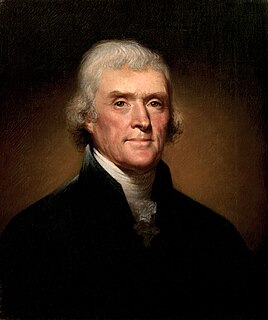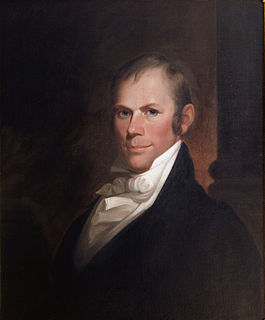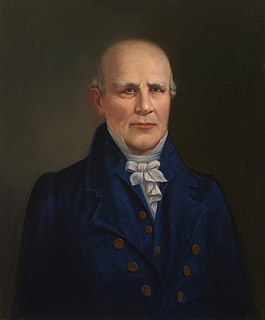
The 1800 United States presidential election was the 4th quadrennial presidential election. It was held from October 31 to December 3, 1800. In what is sometimes referred to as the "Revolution of 1800", Vice President Thomas Jefferson of the Democratic-Republican Party defeated incumbent President John Adams of the Federalist Party. The election was a political realignment that ushered in a generation of Democratic-Republican leadership.

The 1816 United States presidential election was the 8th quadrennial presidential election. It was held from November 1 to December 4, 1816. In the first election following the end of the War of 1812, Democratic-Republican candidate James Monroe defeated Federalist Rufus King. The election was the last in which the Federalist Party fielded a presidential candidate.

The 1822 and 1823 United States House of Representatives elections were held at various dates in different states between July 1822 and August 1823 during President James Monroe's second term.

The 1820 and 1821 United States House of Representatives elections were held at various dates in different states between July 1820 and August 1821 as President James Monroe won reelection unopposed.

The 1816 and 1817 United States House of Representatives elections were held at various dates in different states between April 1816 and August 1817.

The 1812 and 1813 United States House of Representatives elections were held at various dates in different states between April 1812 and August 1813 as James Madison was re-elected president.

The 1808 and 1809 United States House of Representatives elections were held at various dates in different states between April 1808 and May 1809 as James Madison was elected president.

The 1806 and 1807 United States House of Representatives elections were held at various dates in each state between April 29, 1806 and August 4, 1807 during Thomas Jefferson's second term with the new Congress meeting on October 26, 1807.

The 1804 and 1805 United States House of Representatives elections were held at various dates in each state between April 24, 1804 and August 5, 1805. The Congress first met on December 2, 1805. The elections occurred at the same time as President Thomas Jefferson's re-election.

The 1802 and 1803 United States House of Representatives elections were held at various dates in each state, from April 26, 1802 to December 14, 1803 during President Thomas Jefferson's first term in office. It was common in the early years of the United Congress for some states to elect representatives to a Congress after it had already convened. In the case of the 8th Congress, the representatives from New Jersey were only elected after its first meeting on October 17, 1803.

The 1792 and 1793 United States House of Representatives elections, coincided with the re-election of President George Washington. While Washington ran for president as an independent, his followers formed the nation's first organized political party, the Federalist Party, whose members and sympathizers are identified as pro-Administration on this page. In response, followers of Thomas Jefferson and James Madison created the opposition Democratic-Republican Party, who are identified as anti-Administration on this page. The Federalists promoted urbanization, industrialization, mercantilism, centralized government, and a broad interpretation of the United States Constitution. In contrast, Democratic-Republicans supported the ideal of an agrarian republic made up of self-sufficient farmers and small, localized governments with limited power.
Thomas Spalding was a United States Representative from Georgia. He was born in Frederica, Georgia, St. Simons Island, Glynn County, Georgia. He studied law and was admitted to the bar in 1795, but did not practice. He engaged extensively in agricultural pursuits.
The 1804 and 1805 United States Senate elections were elections that expanded the Democratic-Republican Party's overwhelming control over the United States Senate. The Federalists went into the elections with such a small share of Senate seats that even if they had won every election, they would have still remained a minority caucus.
The 1806 and 1807 United States Senate elections were elections that had the Democratic-Republican Party increase its overwhelming control of the Senate by one additional Senator. The Federalists went into the elections with such a small share of Senate seats that even if they had won every election, they would still have remained a minority caucus. As it was, however, they lost one of the two seats they were defending and picked up no gains from their opponents.
The 1816 and 1817 United States Senate elections were elections for the United States Senate that had the Democratic-Republican Party gain a net of two seats from the admission of a new state, and which coincided with the presidential election.
The 1802 and 1803 United States Senate elections were elections for the United States Senate which resulted in the Democratic-Republican Party maintaining and expanding their majority of seats.

The 1802 United States House of Representatives elections in New York were held from April 27 to 29, 1802, to elect 17 U.S. Representatives to represent the State of New York in the United States House of Representatives of the 8th United States Congress.

The 1804 United States House of Representatives elections in New York were held from April 24 to 26, 1804, to elect 17 U.S. Representatives to represent the State of New York in the United States House of Representatives of the 9th United States Congress. At the same time, a vacancy was filled in the 8th United States Congress.

The 1806 United States House of Representatives elections in New York were held from April 29 to May 1, 1806, to elect 17 U.S. Representatives to represent the State of New York in the United States House of Representatives of the 10th United States Congress.
The 1824 and 1825 United States Senate elections were elections for the United States Senate that saw the Jacksonians gain a majority over the Anti-Jacksonian National Republican Party.








